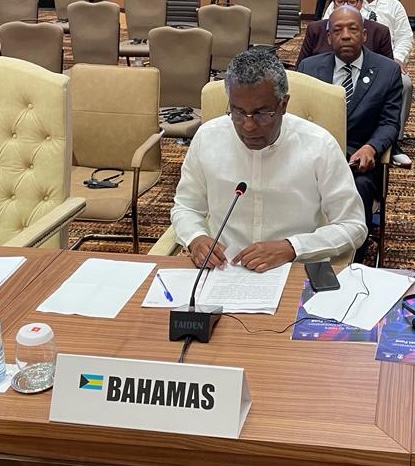Minster the Hon. Frederick A. Mitchell’s Intervention at the Third South Summit, Kampala, Uganda
Your Excellency, Miguel Mario Díaz-Canel Bermúdez, current Chair of the Group of 77 and China, Your Excellency Yoweri K. Museveni, Chair of the Third South Summit, [Your Excellency Dennis Francis, President of the 78th Session of the United Nations General Assembly, Your Excellency António Guterres, Secretary General of the United Nations]
Excellencies, I bring greetings on behalf of my Prime Minister, the Honourable Philip Davis. As I look around this hall, I am pleased to see familiar faces from Havana and I look forward to meeting more delegates of this important grouping here in Kampala. As fellow members of the G77 we have an obligation to leverage our collective, bargaining power and shape global policy and influence global norms, structures and institutions.
Under Cuba’s leadership, the G77 + China has given much attention to critical issues as debt relief, climate finance, sustainable development, and poverty eradication. We look forward to Uganda’s leadership, which we know will continue to advocate for the interests of the global South with determination, agility, innovation and, most importantly, solidarity.
The Bahamas is an archipelagic state of 700 islands; we are extremely vulnerable to external economic shocks and greatly impacted by the effects of climate change. We have suffered several major hurricanes in the past decade; Hurricane Dorian in 2019 caused US dollar 3.4 billion in damage equivalent to 25 percent of The Bahamas’ GDP. In her preliminary observations, Kenyan legal scholar and Independent expert on the effects of foreign debt, Dr. Attiya Waris cautioned that ‘The Bahamas is currently faced with great challenges, in particular, owing to its ranking as a high-income country in the current climate change context, these challenges greatly affect its capacity to maintain a stable economy and develop progressively while raising funds to provide for the basic needs of its population, but also to adapt and rebuild repeatedly after the increasing occurrence of natural disasters. In other words, our climate vulnerability has an adverse impact on our full and effective enjoyment of human rights including our right to development.
For The Bahamas, foreign exchange earnings are produced by both tourism and financial services which are the two main economic pillars of our economy. Many countries in the Global South, including The Bahamas, offer tax and other incentives to attract investment in tourism, export processing, and manufacturing. And yet we are portrayed as a danger to the revenue bases of developed nations just by our existence.
International tax administration and cooperation have harmed us: our sovereignty has been infringed, tax competition is threatened, economic growth and development have been hindered. Against this backdrop, the risk of climate change and increasing sea levels have exacerbated the vulnerability of already fragile countries in the region. It is imperative that we examine these issues and seek to ensure equity and inclusivity in the measures taken to address these concerns.
As the members of the Group of 77 and China are aware, United Nations General Assembly Resolution 78/230 of 23rd December 2023 allowed for the creation of a United Nations Framework Convention on International Tax Cooperation.
Following this hard-won and timely contribution to the betterment of the international financial architecture, The Bahamas will serve among other GRULAC member states, together with the other four regions of UN member states, as a member of the Ad Hoc open-ended Intergovernmental Committee to prepare draft terms of reference for a United Nations Framework Convention on International Tax Cooperation. We look forward to close collaborations with G77+ China as we seek to secure a more inclusive international tax system.
Excellencies,
The G77, which in 50 years has grown from 77 to 135, is a voice for the majority in a system built for a minority. A system that is gridlocked and unable to deliver consensus-based solutions for the people who need them most. The UN Security Council has failed to implement certain General Assembly resolutions and looking back to 2023, six vetoes were cast on five resolutions. This represents a higher volume than years past at a time when we are witnessing humanitarian catastrophes throughout the Global South.
This is reminiscent of the 1960s where the procedures and working methods of the council were subject to politicization and ideological divides resulting in inaction. We cannot return to this pattern of polarisation.
The Caribbean, a region with a total population of approximately 44 million, understands what it means to be treated unequally in the international system. As a region, we have embraced the impulse of reform and we have agreed to tackle Council paralysis and reform in keeping with our common reform objectives of expansion of the council; an enhanced role for developing countries; and fixed time frame negotiations based on a single consolidated text.
We welcome Guyana in joining the UNSC this month for the third time as a non-permanent member. We look forward to putting forward our candidature during the 88th Session of the UN General Assembly in 2031 for the term 2032-2033.
The theme of this Third South Summit is ‘Leaving No One Behind’. The more we increase our cooperation in areas of climate change, trade, investment, sustainable development and digital transformation, the more likely we are to eradicate poverty, increase livelihood security and prevent conflict.

